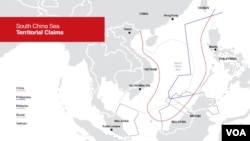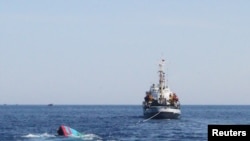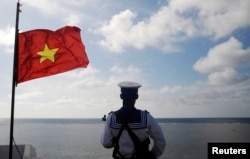Vietnam is quietly fostering a state-supported fishing boat militia to hold off China at sea even as the two sides talk formally about easing their sovereignty dispute, according to experts who follow the issue.
The Southeast Asian country is encouraging its commercial fishing fleet to use stronger boats and take military-trained personnel to sea in case of a clash with China, analysts who follow the country say. China has its own fishing militia, in the same body of water.
“I think it’s a good policy to avoid future conflicts where militia fishermen are out in the sea and if there are some tensions,” said Trung Nguyen, dean of international relations at Ho Chi Minh University of Social Sciences and Humanities.
Development of the Vietnamese militia since at least 2009 comes despite regular talks between the two governments, with the latest just this week.
The Vietnamese Communist Party general secretary met the visiting Chinese foreign minister Monday to suggest “joint safeguarding (of) maritime peace and stability,” China’s Xinhua News Agency said.
Vietnam may be “flexing muscle” now in case talks fail to produce results, said Eduardo Araral, associate professor in the National University of Singapore’s school of public policy.
How the militia works
The Vietnamese militia has not gone to battle with China, and if it did it would risk facing the world's third largest military.
But Vietnamese military units are arming fishing boats, said Carl Thayer, Southeast Asia-specialized emeritus professor at the University of New South Wales in Australia.
That procedure may be similar to the deployment of former soldiers to help keep public order as needed on land in Vietnam, he said. Vietnam requires conscription, he added, so fishermen would already have basic military skills.
“Putting them at sea would just be getting people the right age and giving them that training,” he said. “All they did is move what they do on land, how to defend factories et cetera, and extend that to sea, so I’d imagine it’s the same thing.”
Thirteen fishing militia platoons are helping more than 3,000 fishermen work near the South China Sea's Paracel Islands, according to a 2017 study by scholars with the S. Rajaratnam School of International Studies in Singapore. China controls the Paracels, but Vietnam claims the chain as its own.
The maritime militia got a boost in 2009 when the Vietnamese National Assembly passed a law recommending that self-defense militia escort Vietnamese fishing fleets.
The more than 10,000 fishermen and roughly 2,000 fishing boats in Khanh Hoa province of southern Vietnam have received infrared night vision binoculars and firearms, the study from Singapore says.
Vietnam issued a protocol in 2014 to aid fishermen who build “modern large capacity” ships, often steel ones, to expand their reach, the study adds. It says Vietnamese banks had lent $176 million to fishermen for upgrades of some 400 ships.
Record of clashes
China claims about 90 percent of the 3.5 million-square-kilometer South China Sea. Vietnam says it should control the sea’s waters off its long north-south coastline extending into the Paracel and Spratly Island chains.
Sailors died in clashes between the countries in 1974 and 1988. The positioning of a Chinese oil rig in 2014 sparked a boat-ramming incident at sea and deadly rioting in Vietnam against Chinese interests.
China has long nurtured its own fishing militia as a “grassroots” effort with formal military support and attention from President Xi Jinping, scholars from the U.S.-based Naval War College’s China Maritime Studies Institute have written. Armed fishing boats help defend China’s maritime claims by “harrying and diverting” foreign vessels, the political intelligence firm Stratfor said in 2016.
Five other governments claim all or parts of the South China Sea. They dispute China’s land reclamation to build up islets in the sea and the military use of some.
The two Communist countries hold frequent party-to-party and senior-level official talks about settling maritime differences. But talks often fall short of any settlement because of historic distrust, especially now on how to divide undersea oil and gas fields, Araral said.
“Maybe this is some kind of muscle-flexing dynamic on the part of the Vietnamese to say that ‘while we talk we assert our rights,’” Araral said.
A Vietnamese fishing militia will not be able to catch up to the capability and number of personnel under China's militia, he said, but Vietnam feels obligated to try. “So they have to build their own local capabilities and they will do a guerrilla resistance to the Chinese if necessary," he said.
This story was written by Ralph Jennings







